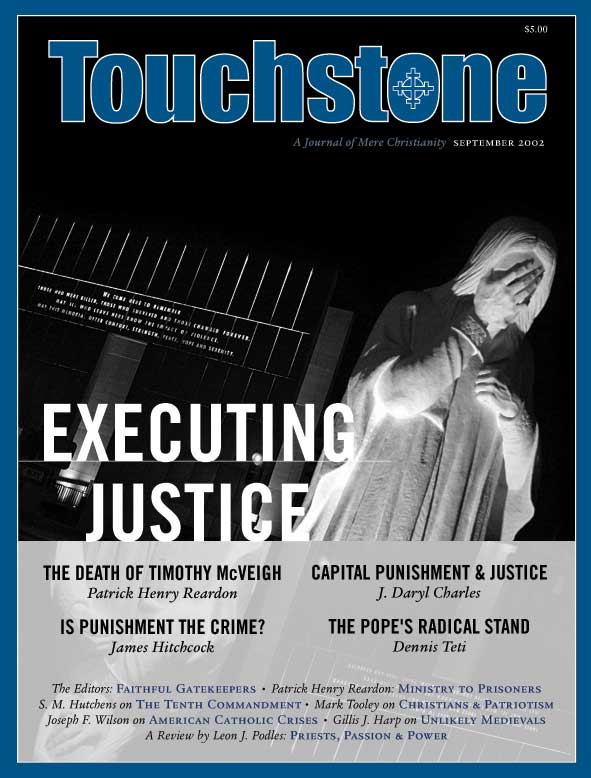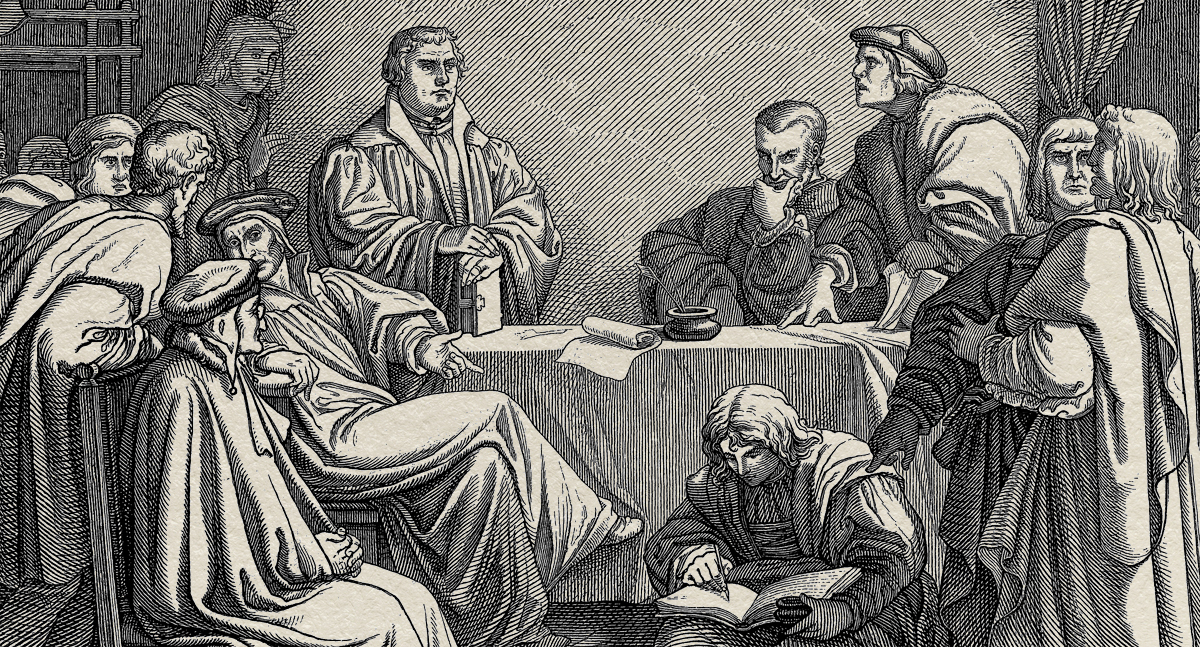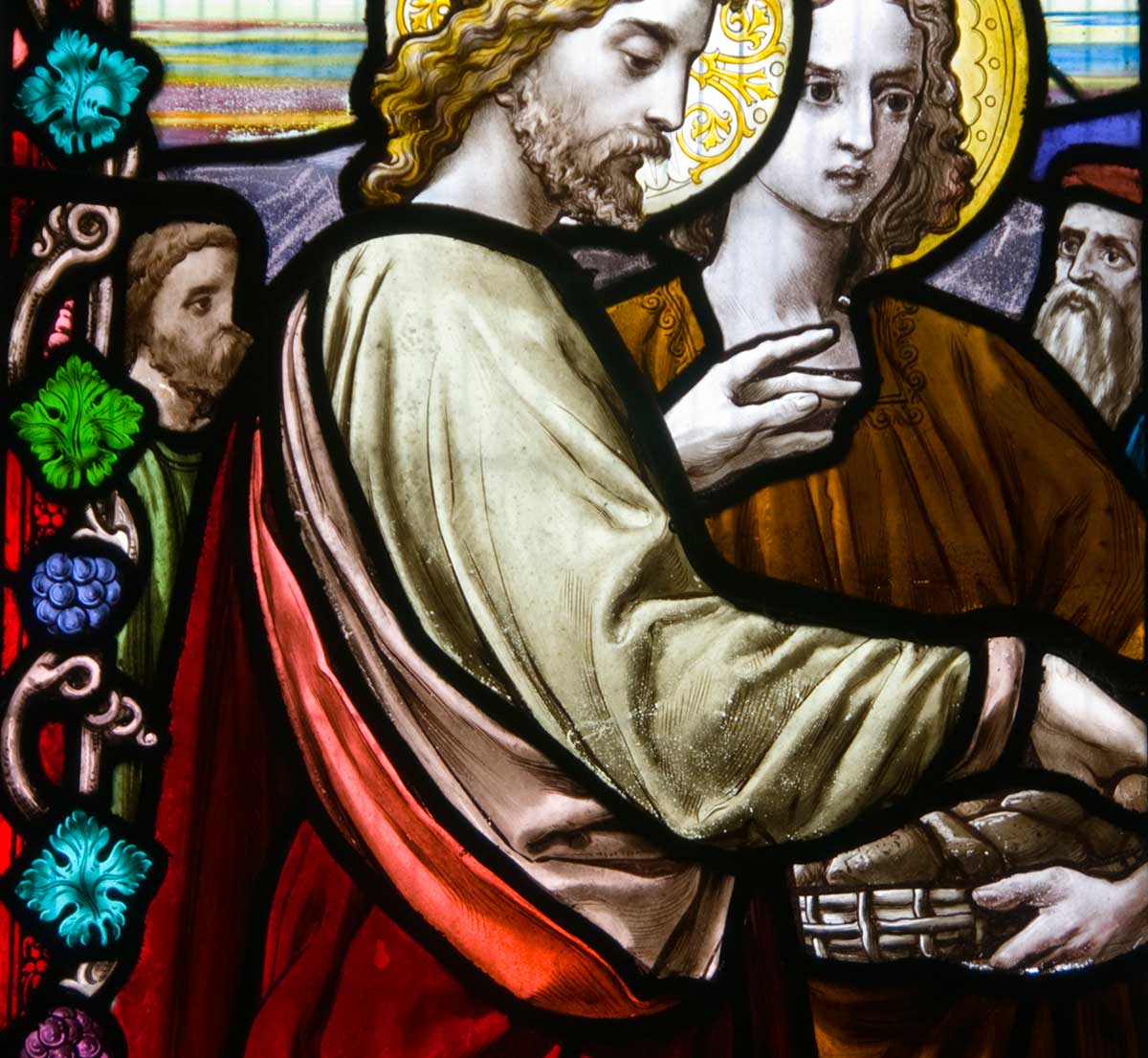Flagging Patriotism
Mark Tooley on Christians & Love of Country
A United Methodist bishop recently wrote a column expressing some reservations about the revived popularity of the patriotic hymn “God Bless America.” “Prayer for God’s blessing is presumptuous when we expect God to bestow blessings in accordance with national boundaries and preconceived notions,” he wrote. “To seek God’s blessings for America and not for the world fails to recognize the wideness in God’s mercy and the expanse of God’s love.”
“God Bless America . . . and the World,” was the column’s headline. I was tempted to wonder why the bishop had limited God’s blessings to one small planet. Shouldn’t he have retitled the hymn “God Bless the Universe”? During a recent meeting of the United Methodist Council of Bishops, the same bishop expressed concern about the “idolatrous” forms of patriotism that were cropping up in United Methodist churches. He is not alone among mainline church leaders who are uncomfortable with American patriotism.
Since the atrocities of September 11, I have attended numerous mainline church agency meetings. The visual contrast between these gatherings and the scene around the rest of the country is striking. Everywhere else, I have seen the American flag proudly flying from houses, bridges, and cars. But at all of the national church agency meetings I attended this fall, involving several hundred denominational leaders, I saw only one individual who displayed a flag. This absence of patriotic symbols cannot be attributed to any kind of aversion to adorning one’s body with political messages. I have often seen mainline church officials festooned with Children’s Defense Fund ties, AIDS ribbons, and buttons expressing solidarity with countless oppressed peoples around the world.
The sentiments expressed at these ecclesial gatherings of course included sympathy for the victims of September 11. There was plenty of talk about pain, anguish, mourning, and fear. “Tragedy” was the recurring word. There was also some overt criticism of the United States, but more commonly, there were vague references to “root causes of terrorism,” with the strong implication that the United States must have committed terrible misdeeds to have earned such hatred.
But overall, the emotional tenor was restrained, almost dispassionate. Either the mainline leaders did not perceive a direct assault upon their own nation and its people, or they felt no outrage about it. Perhaps some did feel some anger as Americans, seeing their country so wounded, but they may have sensed that any expression of such anger would not have been appreciated.
Uneasy with Love
Why is there such unease, if not distaste, with the notion of love of country among mainline church leaders? (There exists a similar problem among some left-of-center Evangelicals and Catholics. But their reasons are different, and merit a separate treatment.) I do not think mainline leaders are uneasy with patriotism because they are so heaven-minded that they disdain any thought of earthly ties. Generally, they are not hermits. Most of them are profoundly involved in the affairs of the world, and they speak passionately of their desire to achieve “justice” in many situations.
I think they are uneasy with patriotism for two reasons. First, many are distressed by the alleged “idolatry” of patriotism. How can we seek God’s blessings particularly for our own nation, they ask, when God loves the whole world? But no serious Christian believes that God confines his love to particular nation-states. Most Christians do understand, however, that God ordains and blesses the special bonds of love that tie Christians and all people to their families, their churches, their friends and communities, and their nations. St. Paul warned that a person who professes to be a Christian but fails to look after his own kindred is worse than a heathen.
We are commanded, as Christians, to love humanity. But that love has little substance unless it begins with the particular love that we can express towards those with whom we have the most immediate contact. As finite humans, we cannot abstractly love every one of the earth’s creatures with absolute equality. Only a transcendent God can achieve such wideness. And even he forges special bonds of love, with his Son and with his Church.
The love that we reserve for family, for friends, for the Church, and for our nation is naturally more passionate than the love we are commanded to have for all humanity. The love that we are supposed to show supremely toward God is modeled in the intimate love we share with persons whom we cherish.
There are, it is true, limits on our more particular loves. We must not allow one love to obscure another. Thus, Christ warned that we must “hate” our family if we are to follow him. In this dramatic use of hyperbole, clearly Christ did not intend that we literally despise our relations. As seen from his other admonitions to love parents, children, and spouses, he was simply admonishing that we place our love for him first, before all other loves. We cannot rightly and effectively love our families, friends, and country unless we place them within the context of our love for God, who first loved us all.
Churches are called to remind Christians everywhere that their love of God must come before love of country. But love of God does not preclude love of country, any more than it precludes love of family. Indeed, God commands that we love the people with whom he has placed us.
The love that most of us have for our country, like the love that we have for family, is not entirely an affair of the mind. It is also an affair of the heart, passionate and not entirely rational. How would we respond to a mother who, after her child was killed, remarked dispassionately that children are killed every day? “But that was your child!” we would exclaim. We would not accept such a catatonic, inhuman attitude of detachment. We all naturally and rightly assume that every parent reserves special love for his or her own children, much as God uniquely loves his own Son.
An Intentional Assault
This leads to the second reason mainline church leaders are so uneasy with patriotism: They are ashamed of America. We should be disturbed by Christians who are so eerily tranquil about the September 11 attack upon America. It was not simply a tragedy. Nor was it simply an act of mass murder. It was an intentional assault upon the American people, upon our culture, upon our history, upon our system of government, and upon our religious beliefs.
Why has this not aroused more heart-felt revulsion among mainline church officials who are fellow citizens of our country? Are they so cold toward their native land, and are they such ardent citizens of the world, that they cannot express any special love for their own country?
Most Americans, including most Christians, feel a slight tingle when they see the flag flying illuminated in the night, or when they hear the national anthem sung with special feeling. They recall immigrant ancestors from every continent, many of them Christian refugees, who sacrificed that they might come here to live in relative safety and freedom. They recall the many hundreds of thousands who have given their lives in our nation’s defense. They recall the heroes who have led us in times of crisis, and the patriots who first conceived our land as a special refuge from the world’s tyranny and poverty.
Most Americans realize, however inarticulately, that our country was conceived and built with much suffering and sacrifice and effusion of blood, and that it would be the worst form of ingratitude to fail to acknowledge these vast efforts waged over the centuries on our behalf.
Christians believe that God presides over all the nations, that he judges the nations, that he lifts them up and tears them down. He blesses some in special ways, for reasons understood completely only by him. Who but the most blind can fail to admit that God has blessed our own country in ways and on a scale never seen before in the history of humanity?
Why has he done so? Perhaps our nation is meant to be an instrument for spreading the gospel, as we export Bibles and missionaries as no other country in history. Perhaps God intends that America draw on its unparalleled prosperity to show unprecedented generosity to the needy. Perhaps he may employ our country to demonstrate how people of all races and classes can join together to govern themselves under a system where all stand equal before the law. Perhaps he wishes the United States to be a model of freedom, where all have the opportunity to pursue their personal vocations and to worship God according to their consciences. Perhaps God has established our country as a haven for fleeing, persecuted Christians, who have been flocking to this land continuously for nearly 400 years.
I think that nearly all Americans, even many unchurched persons, recognize that God has blessed America. But too many officials of our churches see little of this. They are fed by the ideologies that guide our official seminaries, whose elitism and ambivalence about America have been notorious for several decades. When these church officials think of America, they recall slavery, wars against the Indians, disenfranchised women, segregation, industrial exploitation, and environmental degradation. Where most Americans reflect with gratitude upon the sacrifices of American soldiers in so many wars, these church officials recoil from imperialism and self-interest. Where most Americans see blessing, these church officials see sin and shame.
The blindness and ingratitude of our mainline officials when it comes to our country should cause us sorrow. They have deprived themselves of fully enjoying and honoring one of God’s gifts to us, our native land. On the issue of patriotism, as on so many other issues, they have divorced themselves from the mainstream of their churches. Thus, they cannot really enjoy their churches any more than they enjoy our country, because inwardly they feel superior to most of its members.
A Frustrating Wait
Many of our church’s officials anxiously await a new day, when national borders are erased and international peace is established through treaties, goodwill, and international courts. They dream of a world government under which the whole human species will dwell together in a political form of universal free love. They have a long and frustrating wait ahead of them.
Meanwhile, we ordinary members of the church can savor the gifts, including the gift of country, among other ties of human affection, which God has given us during our brief sojourn in this fallen world. And we can continue to pray and sing that God will go on with his blessing of America, however unmerited, to achieve whatever purposes he has in mind.
Mark Tooley directs the United Methodist committee of the Institute on Religion and Democracy (www.ird-renew.org) in Washington, D.C.
subscription options
Order
Print/Online Subscription

Get six issues (one year) of Touchstone PLUS full online access including pdf downloads for only $39.95. That's only $3.34 per month!
Order
Online Only
Subscription

Get a one-year full-access subscription to the Touchstone online archives for only $19.95. That's only $1.66 per month!
bulk subscriptions
Order Touchstone subscriptions in bulk and save $10 per sub! Each subscription includes 6 issues of Touchstone plus full online access to touchstonemag.com—including archives, videos, and pdf downloads of recent issues for only $29.95 each! Great for churches or study groups.
Transactions will be processed on a secure server.
more from the online archives

27.6—Nov/Dec 2014
Tales of Forbidden Stereotypes
Real-Life Men & Women & the Tragic Loss of Human Comedy by Anthony Esolen
calling all readers
Please Donate
"There are magazines worth reading but few worth saving . . . Touchstone is just such a magazine."
—Alice von Hildebrand
"Here we do not concede one square millimeter of territory to falsehood, folly, contemporary sentimentality, or fashion. We speak the truth, and let God be our judge. . . . Touchstone is the one committedly Christian conservative journal."
—Anthony Esolen, Touchstone senior editor








